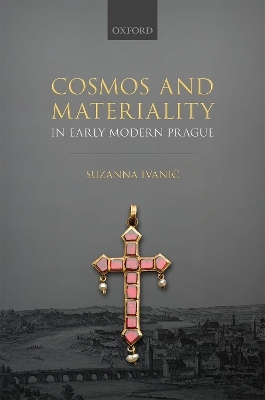
Cosmos and Materiality in Early Modern Prague
Seiten
2021
Oxford University Press (Verlag)
978-0-19-289898-2 (ISBN)
Oxford University Press (Verlag)
978-0-19-289898-2 (ISBN)
In the seventeenth century Prague was the setting for a complex and shifting spiritual world. By studying the city's material culture, this book presents a bold alternative understanding of early modern religion in central Europe.
Prague in the seventeenth century is known as home to a scintillating imperial court crammed with exotic goods, scientists, and artisans, receiving ambassadors from Persia, and also as a city suffering plagues, riots, and devastating military attacks. But Prague was also the setting for a complex and shifting spiritual world. At the beginning of the century it was a multiconfessional city, but by 1700 it represented one of the most archetypical Catholic cities in Europe. Through a material approach, Cosmos and Materiality pieces together how early modern men and women experienced this transformation on a daily basis.
Cosmos and Materiality in Early Modern Prague presents a bold alternative understanding of the history of early modern religion in Central Europe. The history of religion in the early modern period has overwhelmingly been analysed through a confessional lens, but this book shows how Prague's spiritual worlds were embedded in their natural environment and social relations as much if not more than in confessional identity in the seventeenth century. While texts in this period trace emerging discourses around notions of religion, superstition, magic, and what it was to be Catholic or Protestant, a material approach avoids these category mistakes being applied to everyday practice. It is through a rich seam of material evidence in Prague - spoons, glass beakers, and amulets as much as traditional devotional objects like rosaries and garnet encrusted crucifixes - that everyday beliefs, practices, and identities can be recovered.
Prague in the seventeenth century is known as home to a scintillating imperial court crammed with exotic goods, scientists, and artisans, receiving ambassadors from Persia, and also as a city suffering plagues, riots, and devastating military attacks. But Prague was also the setting for a complex and shifting spiritual world. At the beginning of the century it was a multiconfessional city, but by 1700 it represented one of the most archetypical Catholic cities in Europe. Through a material approach, Cosmos and Materiality pieces together how early modern men and women experienced this transformation on a daily basis.
Cosmos and Materiality in Early Modern Prague presents a bold alternative understanding of the history of early modern religion in Central Europe. The history of religion in the early modern period has overwhelmingly been analysed through a confessional lens, but this book shows how Prague's spiritual worlds were embedded in their natural environment and social relations as much if not more than in confessional identity in the seventeenth century. While texts in this period trace emerging discourses around notions of religion, superstition, magic, and what it was to be Catholic or Protestant, a material approach avoids these category mistakes being applied to everyday practice. It is through a rich seam of material evidence in Prague - spoons, glass beakers, and amulets as much as traditional devotional objects like rosaries and garnet encrusted crucifixes - that everyday beliefs, practices, and identities can be recovered.
Suzanna Ivanič is a cultural historian of early modern Central Europe interested in religion, material and visual culture, and travel. She gained her PhD from the University of Cambridge. After a post lecturing at the University of Cambridge she joined the University of Kent as a Lecturer in Early Modern History.
Introduction: Prague - An Urban Cosmos
Part I: A Shared Cosmos
1: Natural Matter
2: A Matter of Kinship
3: A Cosmos in the Making
Part II: The Cosmos and Confessions
4: The Clockmaker's Cosmos
5: Fracturing Universal Christianity
6: Domesticating the Baroque
Conclusion
| Erscheinungsdatum | 01.09.2021 |
|---|---|
| Verlagsort | Oxford |
| Sprache | englisch |
| Maße | 165 x 240 mm |
| Gewicht | 540 g |
| Themenwelt | Geschichte ► Allgemeine Geschichte ► Neuzeit (bis 1918) |
| Geisteswissenschaften ► Geschichte ► Regional- / Ländergeschichte | |
| Geschichte ► Teilgebiete der Geschichte ► Kulturgeschichte | |
| Religion / Theologie ► Christentum ► Kirchengeschichte | |
| ISBN-10 | 0-19-289898-1 / 0192898981 |
| ISBN-13 | 978-0-19-289898-2 / 9780192898982 |
| Zustand | Neuware |
| Informationen gemäß Produktsicherheitsverordnung (GPSR) | |
| Haben Sie eine Frage zum Produkt? |
Mehr entdecken
aus dem Bereich
aus dem Bereich
Giordano Bruno - ein ketzerisches Leben
Buch | Hardcover (2024)
C.H.Beck (Verlag)
CHF 41,85
das dramatische 16. Jahrhundert
Buch | Hardcover (2024)
Rowohlt Berlin (Verlag)
CHF 47,60


